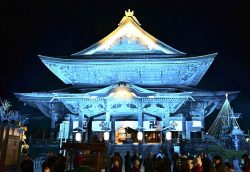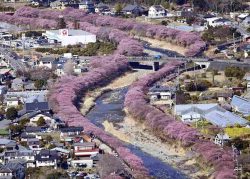2024 JAPAN TRAVEL AWARDS / Travel Destinations Honored for Promoting Diversity, Sustainability
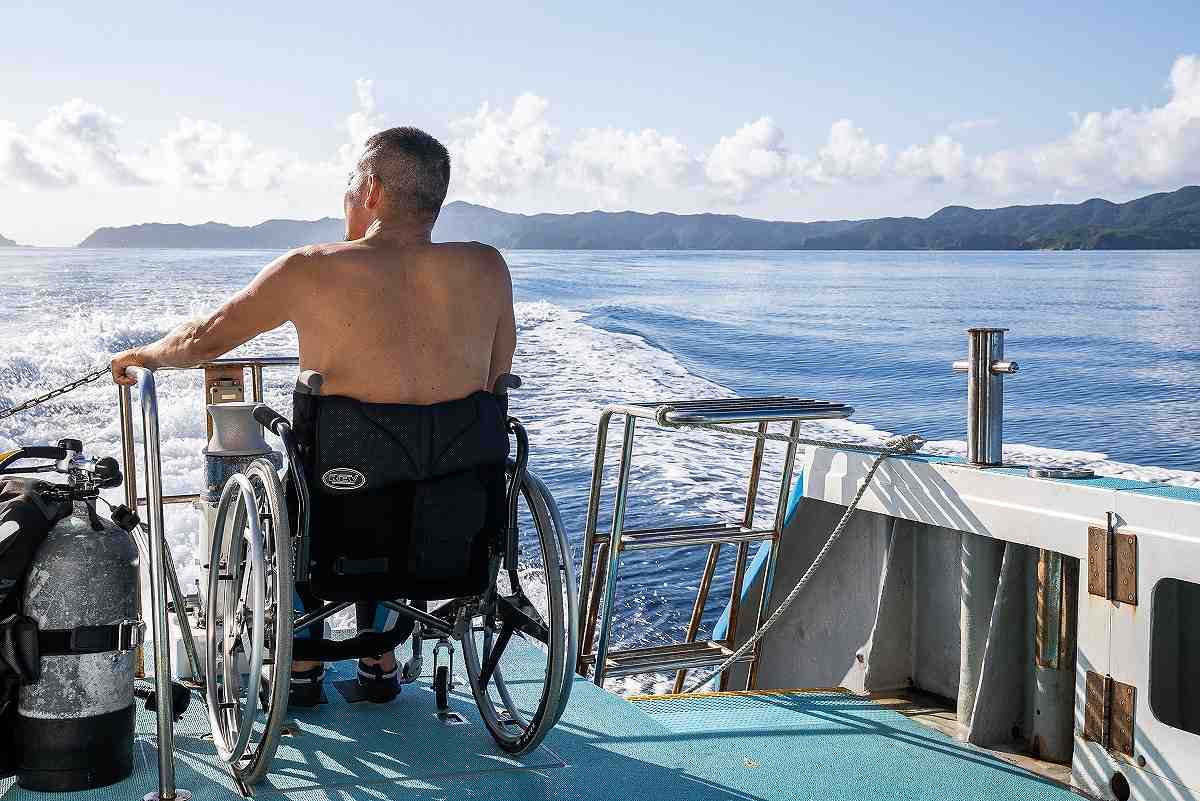
A guest on the boat operated by the Zerogravity marine sports facility on Amami Oshima island in Kagoshima Prefecture
14:17 JST, March 15, 2024
Travel destinations working to promote DEI (diversity, equity and inclusion) and sustainable tourism were honored at the 2024 Japan Travel Awards ceremony in Tokyo, with this year’s winners ranging from a barrier-free marine sports facility to a Buddhist temple inn.
Winners gathered at the Tokyo American Club in Minato Ward on March 7 for the ceremony. A total of 163 entries were submitted for this year’s awards, with winners selected in 10 categories.
“From Hokkaido to Okinawa, these remarkable destinations are changing the way we travel and the way we perceive travel,” said Ally Hongo, chief content officer of Shiitake Creative Inc., the creative agency that founded the awards. “They are breaking barriers to make travel more accessible, more engaging and more welcoming to people from all walks of life.”
Barrier-free marine sports
The 2024 Grand Prix went to the Zerogravity marine sports facility on Amami Oshima island in Kagoshima Prefecture. Praised by the awards for setting “groundbreaking standards in an industry that is often perceived as inaccessible,” Zerogravity offers barrier-free access in its accommodations, pool and boat. Visitors can engage in a range of marine activities, including diving, snorkeling and kayaking.
Zerogravity takes care to respect the dignity of its guests — its boat, for example, is fitted with an elevator that allows divers to enter and leave the water in a wheelchair.
“If someone in a wheelchair wants to go diving … they’d have to crawl along the ground or be carried into the water by someone else,” said founder Junichi Torihata. “And then when they get out, they’d need someone’s help again. They wouldn’t like that. People don’t want others to see them crawling and such.”
Most guests book their next stay before leaving, said Zerogravity director Yuta Kawamoto. “They tell us there’s no other facility like ours. There’s nowhere else in Japan they can have fun like this.”
That may change before long — Torihata hopes to be able to open a new “mini Zerogravity” facility in the Shonan area in the summer of 2025.
An accessible onsen
Two prizes were awarded to the NANIWA ISSUI ryokan inn in Matsue, Shimane Prefecture: best accessible travel and a special recognition award for best accommodation.
Judge Josh Grisdale, who founded the Accessible Japan travel information website and uses a wheelchair himself, was apprehensive when he traveled to the inn to assess it for the awards. “I thought as a wheelchair user: ‘Oh, an onsen? It’ll probably be full of steps and wheelchairs won’t be allowed on tatami,’” Grisdale said in Japanese at the ceremony.
“But when the front door opened, there wasn’t a step but a slope. It felt like it was saying ‘everyone is welcome,’” he said. “And I didn’t have to look up as I checked in; I could talk to the staff at the same height.”
Grisdale also praised the selection of barrier-free rooms that were available, as well as the lift that allowed him to enter an outdoor bath and the staff’s swift service when they adjusted the height of a table for dining.
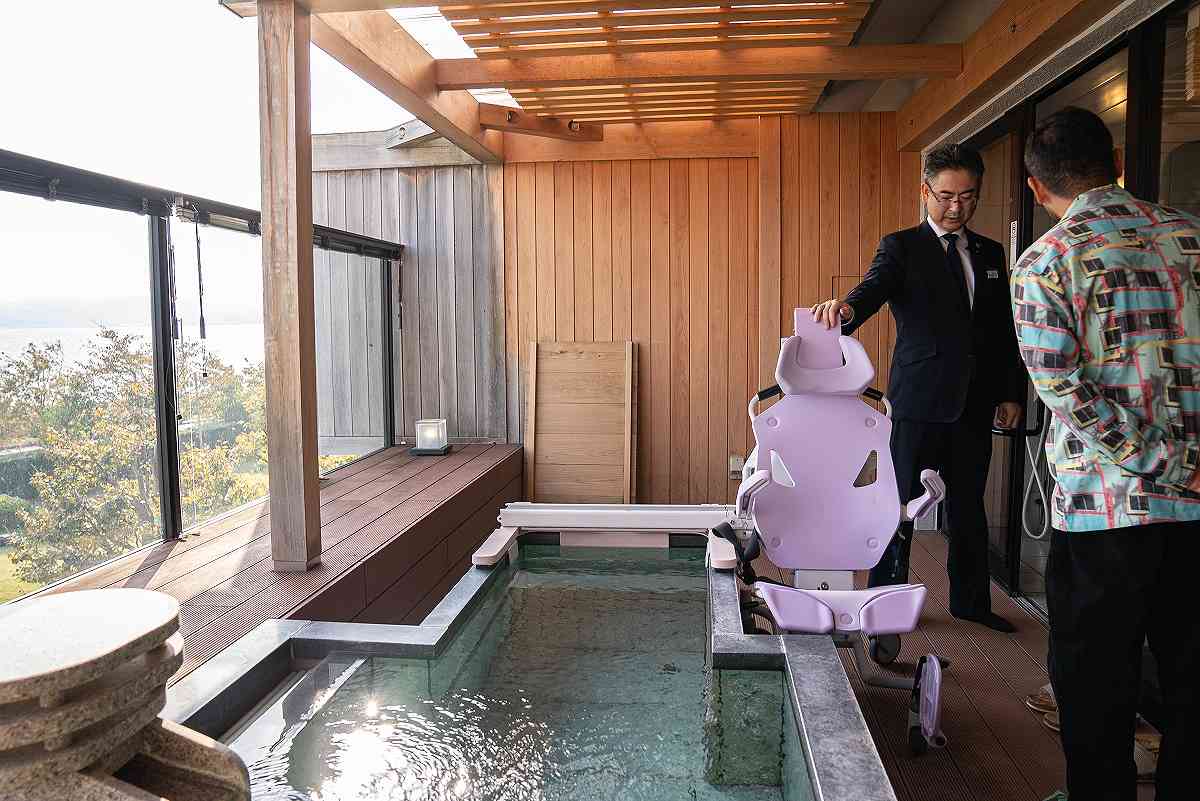
One of the baths at the NANIWA ISSUI ryokan in Matsue, Shimane Prefecture
According to President and CEO Yuji Katsutani, the inn has sought to maintain a Japanese atmosphere as it expands its barrier-free elements. “If we just do everything barrier-free, we’ll end up like a dreary medical or welfare facility,” Katsutani said. “We want our customers to enjoy their stay as we preserve good elements of Japanese culture and architecture.”
Each floor of the ryokan can be also identified by a different scent, such as hinoki Japanese cypress and citrus, a measure that was inspired by feedback from a sight-impaired guest. “We listen carefully to what our guests with impairments want and use that as hints for future renovations and efforts,” Katsutani said.
Responsible tourism
This year’s best sustainable travel award went to Okinawa Diving Service Lagoon in Onna, Okinawa Prefecture, described by the awards as “the perfect example of responsible tourism.” Judge Joy Jarman-Walsh, founder of Inbound Ambassador Co., also praised the experience for “really putting forward the idea of environmental sustainability and regenerative sustainability inside of a successful business model.”
Customers of Okinawa Diving Service Lagoon can participate in such activities as creating coral seedlings and then planting those seedlings while snorkeling or diving.
“I’ve learned from coral the importance of cycles,” said diving instructor Saori Oshima as she accepted the award. “Living coral provides homes and hiding places for small fish, supporting many lives. But even after it’s dead, coral provides food and homes and becomes the foundation for new life,” Oshima said.
“We want to continue considering what Lagoon can do, and act on those things one by one. We want to connect the feelings of local residents and those of the tourists who visit us, and create an even better cycle.
“Lagoon’s purpose is to enrich both nature and people’s hearts.”
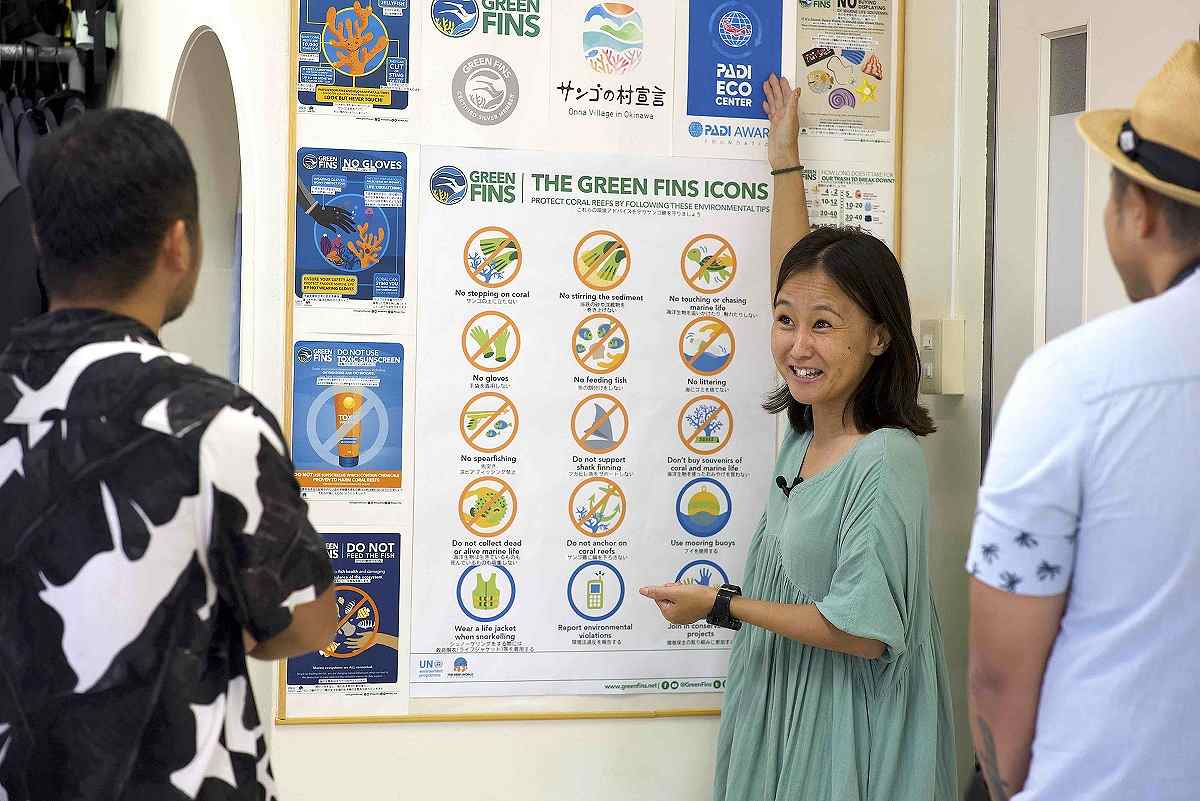
Saori Oshima speaks about Okinawa Diving Service Lagoon’s environmental protection efforts in Onna, Okinawa Prefecture.
Accommodating foreign guests
Temple Stay Kakurinbo, a long-standing temple inn in Yamanashi Prefecture, received the prize for best inbound travel. Located in Minobu, a town dating back 750 years, Kakurinbo is part of Gyogakuin temple, itself 550 years old.
“Hardly any of the Japanese people here today probably know of Mt. Minobu, but there was a time when it was called one of the ‘three sacred mountains of Japan,’” said Junko Higuchi, the representative director of operating company Kakurinshoja. “We feared that if things remained unchanged, [Mt. Minobu] would disappear from the three sacred mountains.”
The inn’s efforts to encourage inbound travel were partly inspired by a desire for “reimportation,” Higuchi said. “We hope that foreign visitors will learn about Mt. Minobu, and that will lead to young Japanese people learning about it.”
Among other elements, the 2024 Japan Travel Awards praised Kakurinbo for “providing a multilingual approach to its services” and “a well-curated and diverse lineup of engaging cultural programs.” These include the copying and chanting of sutras, inkstone carving and a guided tour of Mt. Minobu accompanied by an English speaker.
“I used to think there was nothing in Minobu, that we didn’t have anything to boast about,” Higuchi said. However, visitors have told her “there is true Buddhism here and true nature.”
“They say we can hike, relax in a cafe that caters to vegans and vegetarians. The temple’s food also caters to vegans and vegetarians. This is a place that we can come to rest from our travels,” Higuchi said.
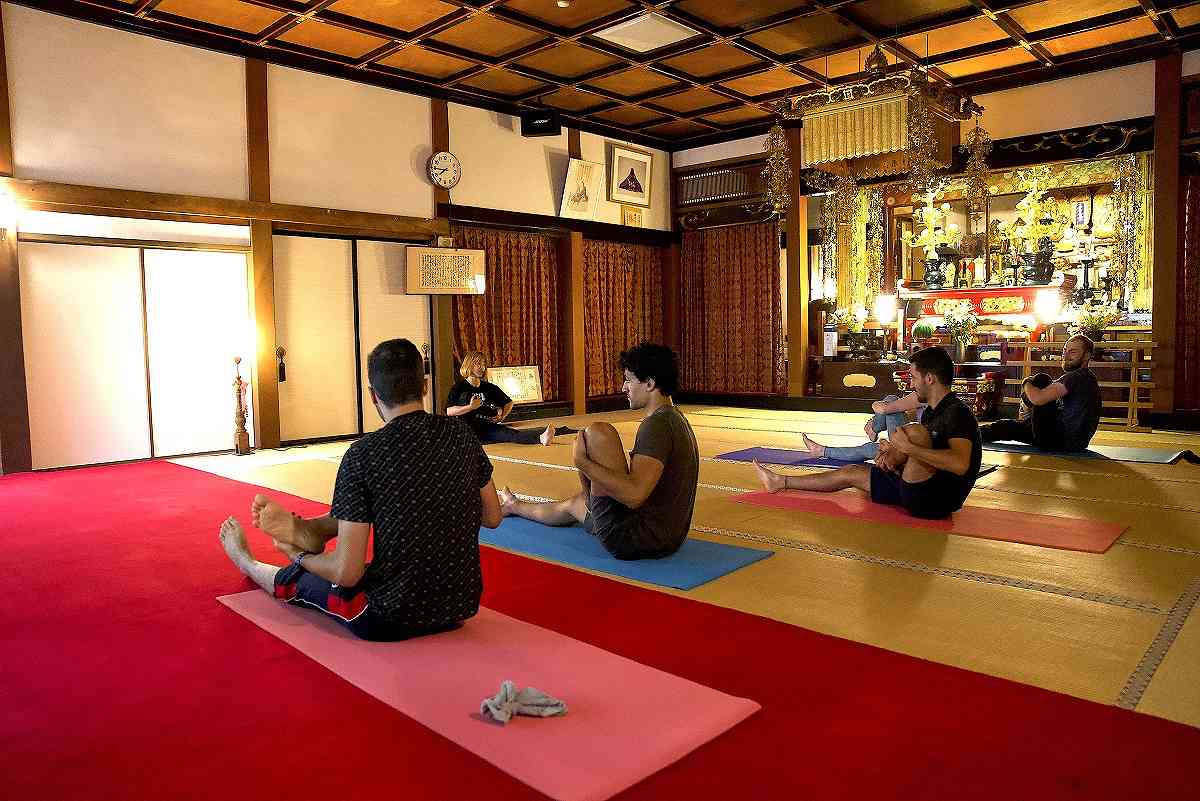
Guests practice yoga at the Kakurinbo temple inn in Minobu, Yamanashi Prefecture.
Welcoming the LGBTQ+ community
The Hotel Palm Royal Naha in Naha, Okinawa Prefecture was named the best LGBTQ+ travel destination for its “dedication to establishing a safer, welcoming and engaging place for all members of the LGBTQ+ community.” It was praised for its “continuous work with local LGBTQ+ groups and hosting and sponsoring regular events that empower the local LGBTQ+ community.”
The hotel’s support efforts started in 2013, according to general manager Naohisa Takakura, when it became a sponsor of Pink Dot Okinawa, the Okinawa edition of an LGBTQ+ event that began in Singapore in 2009 and later spread to other locations around the world.
Through the hotel’s participation in the event, “I realized that these people cannot truly live as themselves, and I was deeply shocked,” Takakura said. The following year, the Palm Royal became the first hotel in Japan to declare itself LGBTQ+ friendly, he said, hanging rainbow flags inside and outside the property.
“Our corporate philosphy is ‘realizing a diversity island Okinawa.’ We want to create a kind island that can cater to anyone who comes to Okinawa, including young and old, male and female, LGBTQ+, people with impairments, people with food allergies and foreign nationals.”
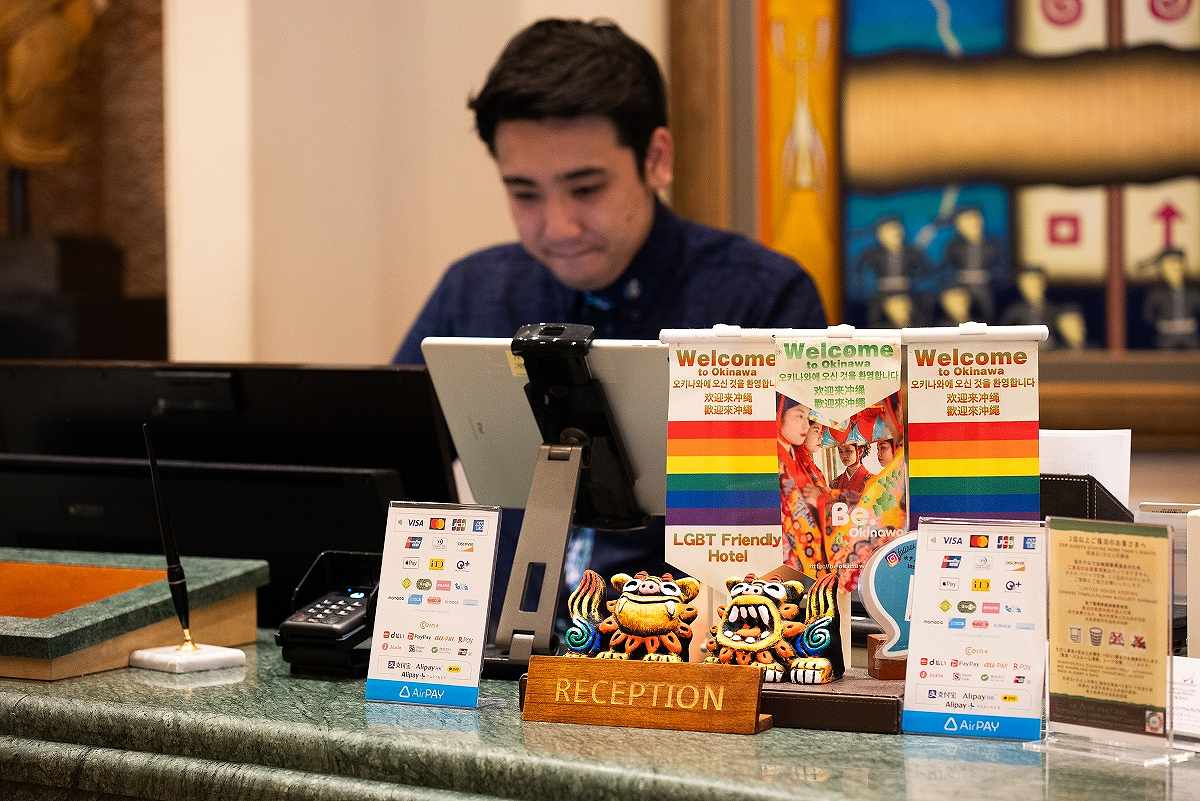
The reception desk at the Hotel Palm Royal Naha in Naha, Okinawa Prefecture
Special recognition awards
A special recognition award was given for best cultural travel to the Ama Hut Satoumian, a restaurant and cultural experience in Shima, Mie Prefecture, that allows tourists to dine with ama female divers.
“This program has created a way to conserve the slowly dying ama culture and provide an additional income for ama divers, who are gradually going out of business,” according to the awards’ website.
Mori no Kuni Valley in Matsuno, Ehime Prefecture, was awarded the special recognition prize for best family travel. “Through their family-friendly accommodation options, diverse nature-inspired activities, and annual kids camps, Mori no Kuni Valley provides the gift of time and the blessings of nature that teach our children, and us adults, important lessons of a lifetime,” the site said.
The special recognition award for best transformative travel was shared by the INOW program in Kamikatsu, Tokushima Prefecture, and the Tautasya self-sustainable eco-village in Miyama, Kyoto Prefecture.
INOW “equips travelers with a deep understanding of the logic and cultural aspect behind Japan’s first ‘zero-waste’ town local policies and how we can all learn from it to address the climate change emergency,” the travel awards said. “Visitors return home equipped with the know-how of what practical steps they can implement in their day-to-day lives.”
Tautasya was praised for offering “multiple lodgings, a restaurant, and outdoor and farming experiences that present the essence of self-sustainable living.”
“The experience is beyond educational for anyone who wants to rethink their existence with nature and invest in a sustainable lifestyle,” according to the travel awards.
The Togakushi Universal Tourism Desk in Togakushi, Nagano Prefecture, was given the special recognition award for best destination development.
The desk has “supported dozens of travelers with mobility disabilities in visiting and exploring the wonders of Togakushi,” the awards said, “renting out multiple offroad and outdoor wheelchairs … building a local barrier-free travel map and through continuously consulting businesses on ways to improve their accessibility.”
Top Articles in Features
-

Tokyo’s New Record-Breaking Fountain Named ‘Tokyo Aqua Symphony’
-

Sapporo Snow Festival Opens with 210 Snow and Ice Sculptures at 3 Venues in Hokkaido, Features Huge Dogu
-

Tourists Flock to Ice Dome Lodge at Resort in Hokkaido, Japan; Facility Invites Visitors to Sleep on Beds Made of Ice
-

High-Hydration Bread on the Rise, Seeing Increase in Specialty Shops, Recipe Searches
-

Heirs to Kyoto Talent: Craftsman Works to Keep Tradition of ‘Kinran’ Brocade Alive Through Initiatives, New Creations
JN ACCESS RANKING
-

Japan PM Takaichi’s Cabinet Resigns en Masse
-

Japan Institute to Use Domestic Commercial Optical Lattice Clock to Set Japan Standard Time
-

Israeli Ambassador to Japan Speaks about Japan’s Role in the Reconstruction of Gaza
-

Man Infected with Measles Reportedly Dined at Restaurant in Tokyo Station
-

Videos Plagiarized, Reposted with False Subtitles Claiming ‘Ryukyu Belongs to China’; Anti-China False Information Also Posted in Japan


